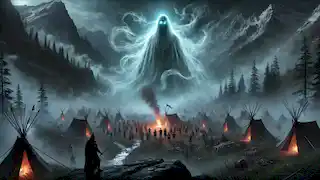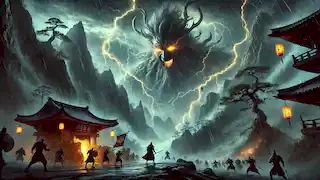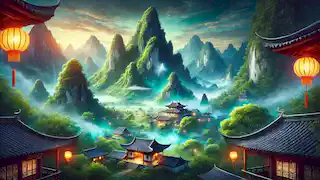Nestled deep in the heart of ancient China, where the Yúnshān Mountains stretched like a jagged spine across the heavens, there thrived the quiet village of Lóngshuǐ. The villagers had long lived under the protective shadow of the mountains, their lives deeply intertwined with the rhythms of nature. Every tree, river, and stone was sacred, and at the core of their beliefs lay the legend of the Mountain Spirit—a guardian whose presence ensured balance and prosperity. Generations ago, before the world was shaped by human hands, the Yúnshān Mountains were believed to be the dwelling place of celestial beings. It was said that the Mountain Spirit was born from the union of heaven and earth, a divine creature imbued with the power to nurture or destroy. The Spirit could take many forms: a majestic beast cloaked in mist, a beautiful figure draped in the colors of the forest, or a voice carried on the wind. The villagers knew the Spirit demanded respect. Each year during the Festival of the Peaks, offerings were made at the Spirit's altar: fruits, grains, and carvings from the wood of fallen branches. This pact had ensured centuries of harmony—until greed threatened to shatter it. It began in the spring of a year now remembered as the Time of Reckoning. Yào Zhàn, a warlord who ruled a neighboring province with an iron fist, turned his gaze toward the Yúnshān Mountains. His advisors spoke of veins of gold buried deep within the mountains and the vast forests that could be harvested for profit. To Yào Zhàn, this was an opportunity too great to ignore. The warlord's armies marched into the foothills, their axes biting into ancient trees, their shovels tearing into the earth. The villagers of Lóngshuǐ were powerless to stop them, though they begged and pleaded. “The mountains are sacred!” cried the elders. “Disturbing them will awaken the wrath of the Spirit.” But Yào Zhàn laughed at their warnings. “Let your Spirit try to stop me,” he said, his voice dripping with arrogance. The first sign of the Spirit’s awakening came as a storm. The skies, once bright with spring’s promise, turned a sickly gray. Winds howled through the village, toppling rooftops and scattering crops. In the mountains, the warlord’s men began to whisper of strange occurrences: tools breaking inexplicably, shadows that moved where no light shone, and the eerie feeling of being watched. Then, one night, the Spirit revealed itself. Cloaked in the swirling mists of the mountaintops, its form shimmered between the shapes of a great beast and a towering humanoid figure. Its glowing eyes pierced through the darkness as it spoke in a voice that echoed like a hundred waterfalls. “Leave these mountains,” the Spirit commanded. “Your greed poisons the land, and your presence desecrates the sacred. Go now, or face the consequences.” But Yào Zhàn was unafraid. He believed in the strength of his armies and the steel of his swords, not in spirits or legends. He ordered his men to continue their work, promising rewards to those who remained loyal. Though fear gripped many, greed proved stronger. As the deforestation continued, the once-lush slopes of the Yúnshān began to wither. Rivers ran dry, their banks cracked and barren. Animals fled the desecrated lands, leaving the forest eerily silent. The Spirit’s anger grew, and with it, the unrest among the villagers. Unable to endure the destruction of their home, the people of Lóngshuǐ turned to their elders for guidance. Lǎo Bái, the oldest among them, had lived nearly a century and remembered stories of the Spirit’s past interventions. “We must seek the Spirit’s forgiveness,” Lǎo Bái urged. “Only through unity and reverence can we hope to restore balance.” Under Lǎo Bái’s guidance, the villagers prepared an offering. At the foot of the mountains, they built an altar adorned with flowers, fruits, and carved figures. There, they prayed as one, their voices a chorus of desperation and hope. To their relief, the Spirit appeared, its form now less fearsome and more serene. It listened as Lǎo Bái spoke on behalf of the villagers, pleading for a way to save their home. The Spirit gave them a challenge: to plant a sacred grove on the mountainside that had been stripped bare. Each tree would represent the villagers’ commitment to the land and their unity as a community. The task was monumental. The soil was dry, the slopes treacherous, and the tools scarce. But the villagers worked tirelessly, carrying water from the river, planting seeds with care, and singing songs to keep their spirits high. As the villagers planted their grove, Yào Zhàn grew enraged. He saw their efforts as defiance and vowed to destroy the sacred grove before it could take root. With his remaining men, he ascended the mountains, determined to confront the Spirit himself. But the Spirit was ready. As the warlord reached the grove, the earth trembled beneath his feet. A storm unlike any the villagers had seen erupted, with winds so fierce they seemed to carry the voices of the ancestors. Lightning illuminated the mountainside, revealing the Spirit in its full, terrifying glory. “Your greed ends here, Yào Zhàn,” the Spirit declared. “You have sown destruction, and now you shall reap its harvest.” The ground opened beneath the warlord and his men, swallowing them into the depths of the mountain. When the storm passed, there was no trace of Yào Zhàn or his army—only silence and the faint whisper of the wind through the newly planted trees. With the warlord gone, the villagers continued their work, nurturing the sacred grove until it flourished. Over time, the rivers began to flow again, the animals returned, and the mountains regained their former glory. The Spirit watched over the land, its presence now gentle but ever vigilant. The villagers marked the site of the sacred grove with a stone carved with the Spirit’s likeness, a reminder of their shared history and the price of harmony. Today, the Yúnshān Mountains stand as a testament to the enduring power of respect and unity. Travelers speak of an ethereal presence, felt but unseen, that seems to guide and protect all who tread lightly upon the sacred land. {{{_04}}} The legend of the Mountain Spirit continues to inspire, a timeless tale of humility, resilience, and the bond between humanity and nature.The Origins of the Mountain Spirit
The Warlord’s Ambition
The First Warning

The Warlord’s Defiance
The Villagers’ Plea
The Sacred Task

The Warlord’s Last Stand

The Restoration of Balance
Epilogue: The Spirit’s Legacy
The Tale of the Mountain Spirit
Reading Time: 6 min

About Story: The Tale of the Mountain Spirit is a Legend Stories from china set in the Ancient Stories. This Descriptive Stories tale explores themes of Nature Stories and is suitable for All Ages Stories. It offers Cultural Stories insights. A tale of harmony, courage, and the spirit of nature’s balance.


















